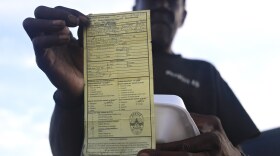Austin Police Chief Brian Manley said revisions to city laws banning camping, panhandling and sitting or lying down will "fundamentally change" how police interact with people experiencing homelessness.
The new laws, which were approved by the Austin City Council in an early-morning vote, require officers to ticket someone only if they deem that person's behavior is a public health or safety hazard. At a news conference Friday, Manley said the new ordinances could allow more people to set up camps or lie down in public.
RELATED | Austin Votes To Scale Back Laws Opponents Say Criminalize Homelessness
"I think the impact will be more on persons’ perceptions of their own safety and our inability now to act in cases where someone may have erected a structure on public space in front of a business, or is sitting and lying in front of someone’s business, but not necessarily hitting that threshold of being dangerous or aggressive," he said.
Watch the entire press conference below.
Chief Brian Manley discusses the no sit/no lie ordinance changes https://t.co/lJg4J8lnYC
— Austin Police Department (@Austin_Police) June 21, 2019
Members of the Downtown Austin Alliance, as well as neighborhood and student safety groups in Central Austin and West Campus, voiced similar concerns last night ahead of the council's vote. It's been a common criticism of the revised ordinances throughout the city's discussion of the rules over the past month.
The revisions lean more on state law, adopting language that prohibits obstruction of a sidewalk and aggressive confrontation – but only if behavior is "hazardous or dangerous." Camping is still banned in public parks.
As it relates to the camping ban, Manley said, officers now will have to triage whether a structure is dangerous or hazardous before ticketing someone, but the ban applies specifically to city-owned parks.
"There may be circumstances where homeless individuals establish a camp, set up a tent – something like that in the green space out in the community," Manley said. "And if it is not on parkland or if it is not on private property ... but instead it is just city land that is non-parkland, we may have limited opportunities, if we cannot establish that that camp is dangerous or hazardous."
RELATED | Most Tickets For Homelessness Result In Arrest Warrants. That Can Make Finding Housing Hard.
Officers must now give warnings and allow people time to comply before giving citations.
Manley said APD is in the process of amending its policies to reflect the new rules, which formally go into effect in 10 days. The change was spurred by criticism that the rules criminalize homelessness and that prohibiting behavior related to homelessness is unconstitutional.







